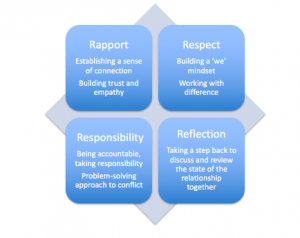
The Business of Relationships by Dr Clare Murray MBACP, Occupational Pyschologist
Let’s talk about relationships. Nothing new here you might think, but work relationships in the 21st Century global business landscape are changing. Not only that, trust-based, collaborative relationships are increasingly emerging as a critical success factor for successful leadership as well as areas of clear commercial value to organizations. Indeed, some authors have gone so far as to describe the current context as a ‘relationship economy.’
So, why is this happening and why do leaders need to place people and relationships at the heart of organizational strategy?
Let us start by setting the scene
The global financial crisis in 2008, along with other, more recent social and political changes such as the surprise votes in the UK EU Referendum and the US presidential election, the explosion of the #MeToo campaign, and the issue of gender pay inequality in the UK, clearly demonstrate that, certainly in the West, employee and public trust in business and political leaders has to some extent eroded. Furthermore, people are not only more challenging of those in power but also the intolerance of the abuse of power and a lack of respect for others in the workplace is growing.
What has been the impact on leadership?
This has necessitated a shift in leadership approach. Not only must leaders focus on ‘what’ they do but also ‘how’ and ‘why’ they do it. Leaders must now be increasingly accountable for their behaviour. This lies at the heart of the current trend seen in leadership, where a more authentic, collaborative, leadership style that builds trust and confidence with both employees and customers is key for organizational success.
And what about the impact on organizations?
At the same time, we are also seeing many organizations, across industries and sectors, choosing to place a strategic focus on issues such as diversity and inclusivity and also to create values-based organizational cultures. As we know, some organizations now also include values in their publically available organizational mission statements (see Murray & Gill, 2018 for the interesting results from our study on kindness and leadership in the UK private and public sector).
We could stop here. It is clear workplace relationships need to change in order for leaders and organizations to survive in today’s business environment. But that is not the end of the story.
We need to re-think Relationships
We need to critically examine workplace relationships in terms of commercial value to an organization. Over the last 5 years my work has not only focused on the nature of workplace relationships but also how we unlock the power of relationships as a force for good in organizations and their full range of diverse stakeholders: what does a ‘good’ relationship look like and how can relationships add value to business?
The impact of the digital revolution and globalization
We need to consider the impact of the digital revolution and globalization on organizations and how they operate. We are now working in a highly complex, fast-paced, uncertain environment, where change is a normative part of organizational life.
The rapid advances in technology and the speed of access to information mean that all industries are being disrupted by the arrival of smaller, more agile competitors who are doing things differently and for less cost. The constant pressure to ‘stay ahead of the game’, has meant innovation or the need to enhance the creative potential of the organization is a consistent strategic priority for most leaders.
We now know that, in order to be truly creative, for innovation to be sustainable and at the pace required, involves collaboration both within and between organizations. But whilst ‘collaboration’ is often an expressed value for many organizations there are plenty of examples in the business literature and from my consulting work to suggest that many businesses fail in their attempts to do this effectively. Why might this be the case?
The answer to this question is, I believe, that leaders need to think about relationships in a slightly different way. To understand the link between creativity/innovation and collaboration more clearly, we can draw on ideas from the field of couple therapy theory and practice.
‘Creative’ couples to ‘creative’ workplace relationships
In couple work, the focus is always ‘the relationship’, rather than the individual partners. The characteristics of the relationship are influenced by what each partner brings to it. Couple relationships are considered to be ‘creative’ when:
1) there is a high level of trust and empathy between partners
2) partners demonstrate respect for each other (acknowledging and accepting equality of differences)
3) each partner is able to accept responsibility for their part in conflict situations, and
4) both partners are able to take a step back and reflect on the relationship and talk about it
Of course, no relationship is this perfect all the time – we are only human – but the simple message is this:
A creative relationship is only possible when we feel mutual trust and respect, where there is a shared ability to accept responsibility and a desire to reflect on the relationship
The Strategic Relationship Model (SRM)
These ideas form the core of the Strategic Relationship Model (SRM), that I have developed, which includes four key areas: Rapport (building trust), Respect, Responsibility, and Reflection with corresponding behaviours for each area.

The SRM makes ‘the relationship’ the focus and provides a behavioural framework that can be applied to different workplace relationships: stakeholder relationships, team relationships, client/customer relationships, and peer relationships, to name but a few. The SRM can be taught, used for development and for measuring the quality of workplace relationships. The SRM can also provide clear steps to develop more narrow, transactional relationships into broader, trust-based collaborative relationships that lead to desired outcomes of better business performance, higher levels of business integrity and growth.
Successful collaboration requires an understanding of and focus on building and maintaining trust-based relationships. Focusing on ‘the relationship’ rather than individual partners (people or teams) as the key to innovation shows the clear commercial value for building collaborative relationships. It also highlights the need for leaders to invest in behavioural and ethical values-based initiatives that drive diversity/inclusivity and where a lack of respect/abuse of power is not tolerated.
This is an area where Tracey and Intelligent Ethics and I are developing some exciting ideas for collaboration, so watch this space.
Final thoughts
The ability to develop and maintain collaborative, trust-based relationships is critical for leadership and organizational success in the 21st Century business landscape. This requires a shift in mindset for leaders, where ‘the relationship’ becomes the focus, not the individuals. Relationships built on mutual trust, respect, and the ability to accept responsibility and to reflect are the necessary conditions required for creativity to flourish.
Yes, we are definitely in a ‘relationship economy.’ Do you want to be part of it?
You can contact Dr Clare Murray MBACP, Organisational Psychologist / Leadership Coach / Relationship Therapist, at clare.e.murray@btinternet.com


